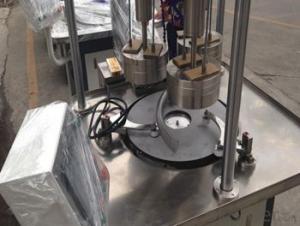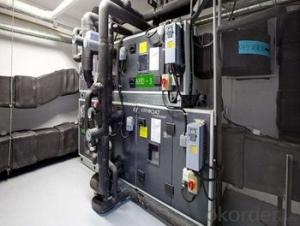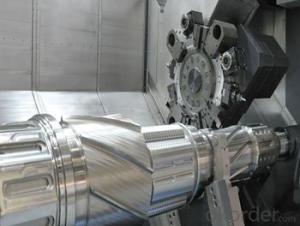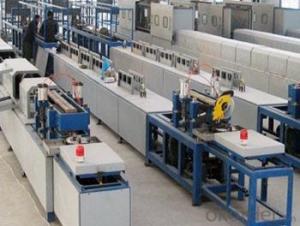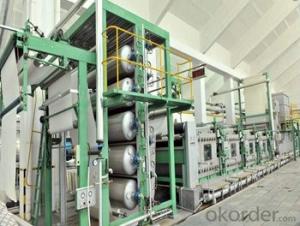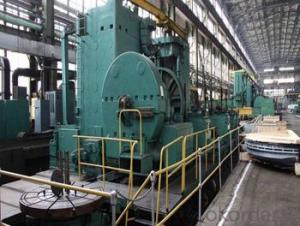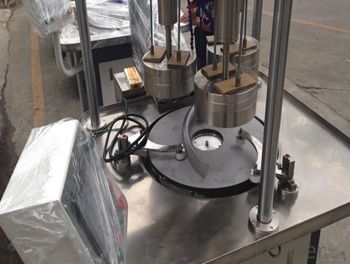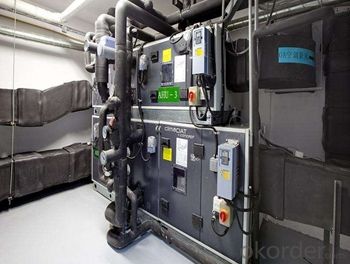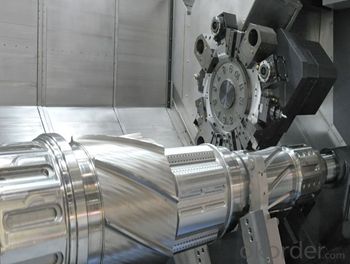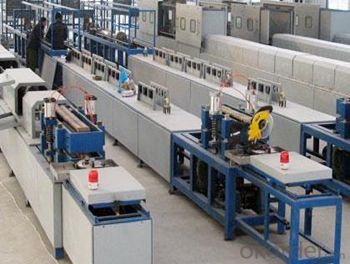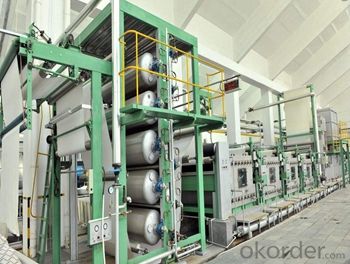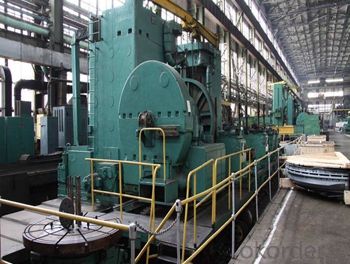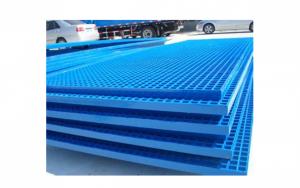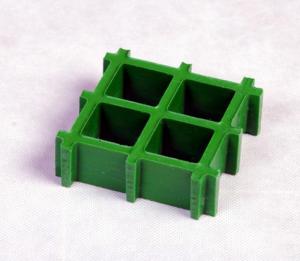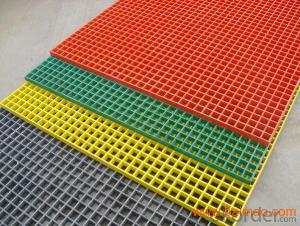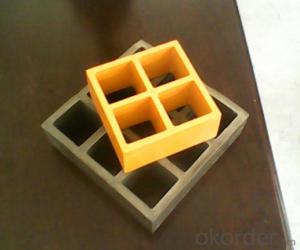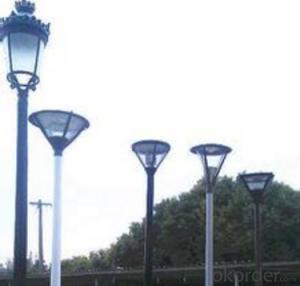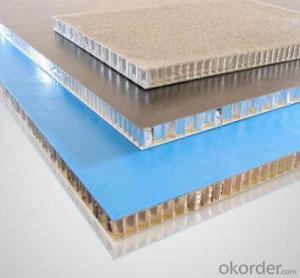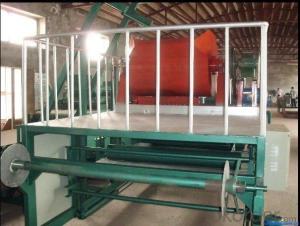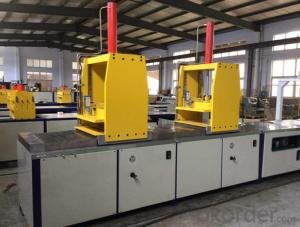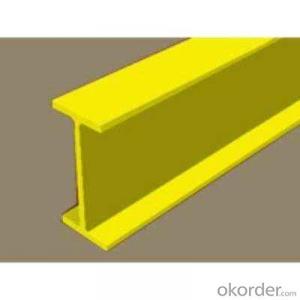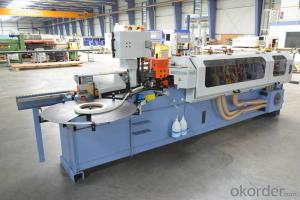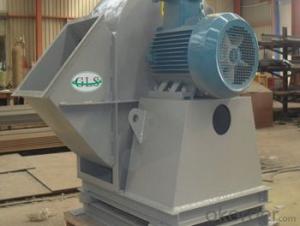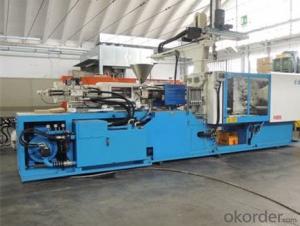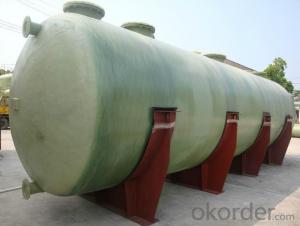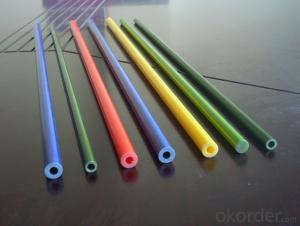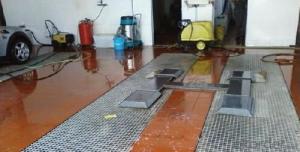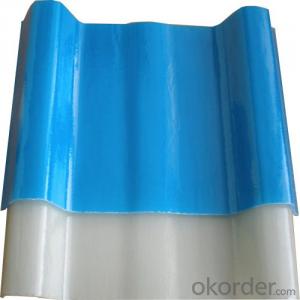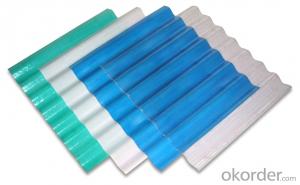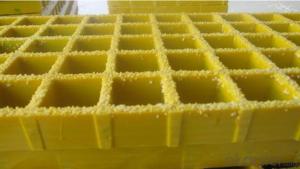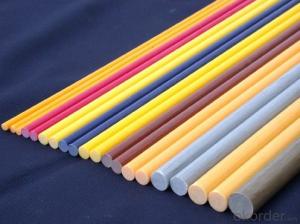FRP Pultrusion Profiles - FRP Pultruded Grating with Anti-Ageing and Best Quality on Hot Sales
- Loading Port:
- Tianjin
- Payment Terms:
- TT OR LC
- Min Order Qty:
- 4000 m.t.
- Supply Capability:
- 300000 m.t./month
OKorder Service Pledge
OKorder Financial Service
You Might Also Like
PRODUCT DESCRIPTION
Pultruded grating is made by a particular assembly process, which using “I” shape as its main load-bearing and special rod to go through the bearing bar. Pultruded grating include the standard grating and the custom grating, the custom grating can be designed to meet customer’s requirement or special using condition by changing the shape, size and space of the bearing bars, the surface can be covered with lozenge panel, grit panel, or added the anti-slippery sand directly.
FRP pultruded grating has the most characteristics of molded grating, but it has its distinct advantages, it has very high fiberglass content in the loading direction, so it has very high load capability, it has more superiority when used at wide span, so that the basic support will be decreased and the project cost will be reduced accordingly.
SPECIFICATION
Thickness (mm) | Bar width (mm) | Open space (mm) | Open rate (%) | Approx weight (kg/m |
25.4 | 15.2 | 22.8 | 60 | 13.2 |
25.4 | 15.2 | 15.2 | 50 | 15.9 |
25.4 | 15.2 | 10.1 | 40 | 18.5 |
25.4 | 40 | 10.8 | 21 | 14.5 |
38.1 | 15.2 | 22.8 | 60 | 15.8 |
38.1 | 15.2 | 15.2 | 50 | 19.1 |
38.1 | 15.2 | 10.1 | 40 | 22.4 |
50.8 | 25.4 | 25.4 | 50 | 16.6 |
50.8 | 25.4 | 12.7 | 33 | 21.1 |
FEATURES
a. Anti-corrosion and anti-rust
b. Light weight and high strength
c. Anti-flammable
d. Anti- fatigue
e. Safe and anti-slippery
f. Anti-ageing
g. Easy of maintenance
h. Excellent electromagnetism property
i. Good economic benefit
FIELDS SERVED
Sewage treatment,
water supply and drainage,
chemical industry,
oil industry,
power engineering,
pulp and paper,
construction engineering,
spinning, marine engineering.
APPLICATION
Operation terrace,
stair walkway,
ground floor,
trench cover,
sidewalk,
foot bridge,
equipment safety fence,
scaffold.
COMPANT DESCRIPTION
CNBM,China National Building Materials Group is a state-owned enterprise in charge of administrative affairs in china building materials industry. Established in 1984, CNBM is a large group corporation of building materials with total assets of 25 billion RMB and a total staff of 30,000.CNBM now owns 200 subordinating firms of solely owned and joint-venture companies.
CNBM International Corporation is one subsidiary of CNBM, we focus on offering good-quality products,professional service and complete solution to our customers. Strong delivery capacity, advanced technology& management, strong financing capability and excellent after-sale service are our advantages in sharing international market.
FAQ
1.Q:Are you factory or trading company ?
A:We are Factory produce FRP machines and FRP products.
2.Q:If can customized by customers requirements?
A:yes,we can produce the machine with customized size.
3.Q:How about the payment?
A:We accept any kind of payment.
4.Q:What is the guarantee?
A:Gurantee is one year.
5.Q:If you can training?
A:yes ,we can training in our factory also can send engineers to your factory training.
PICTURES
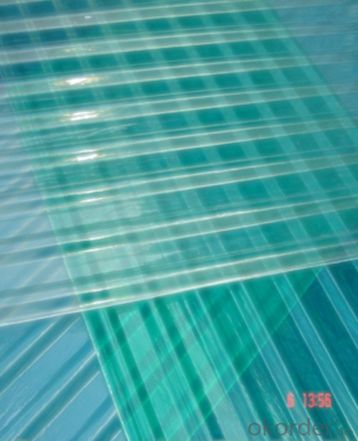
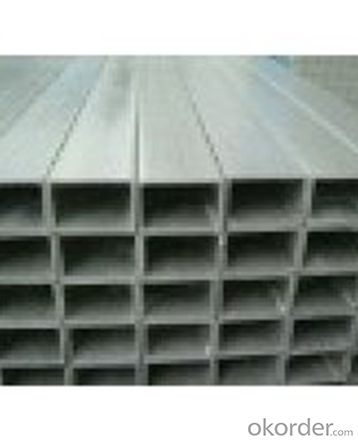
- Q: Can FRP pultrusion profiles be used in the production of electrical cabinets?
- Yes, FRP (Fiber Reinforced Polymer) pultrusion profiles can be used in the production of electrical cabinets. FRP pultrusion profiles provide excellent electrical insulation properties, high strength-to-weight ratio, and resistance to corrosion, making them suitable for use in electrical cabinets where electrical safety and durability are essential.
- Q: Are FRP pultrusion profiles resistant to high-pressure gas?
- Yes, FRP (Fiber Reinforced Polymer) pultrusion profiles are generally resistant to high-pressure gas. FRP materials have excellent chemical resistance and are often used in applications where they come into contact with various chemicals, including gases under high pressure. The specific resistance of FRP pultrusion profiles to high-pressure gas will depend on the specific resin and reinforcement used in their construction. It is important to consult the manufacturer's specifications and guidelines to ensure that the specific FRP profiles being used are suitable for the intended high-pressure gas application.
- Q: Are FRP pultrusion profiles resistant to termites or other pests?
- Yes, FRP (Fiber Reinforced Polymer) pultrusion profiles are highly resistant to termites and other pests. The composition of FRP, which includes resin and glass fibers, makes it an inhospitable material for pests. Unlike wood, FRP does not provide a food source or favorable conditions for termites or other pests to thrive. Therefore, FRP pultrusion profiles are an excellent choice for applications where resistance to pests is required.
- Q: Can FRP pultrusion profiles be used in mining applications?
- Mining applications can utilize FRP pultrusion profiles, which are known for their high strength-to-weight ratio, durability, and corrosion resistance. These profiles are suitable for a range of purposes in mining operations. They can provide structural support in underground mines, including the construction of tunnels, shafts, and mine roofs. Their strength allows them to handle heavy loads and provide long-term support. Additionally, FRP pultrusion profiles can support equipment and machinery like conveyor systems, pumps, and tanks. Their corrosion resistance makes them ideal for use in harsh mining environments that involve exposure to moisture, chemicals, and abrasive materials. Moreover, FRP pultrusion profiles can be used for safety applications in mining, such as handrails, walkways, and grating systems. These profiles offer reliable and non-slip surfaces, ensuring the safety of mining workers. In summary, FRP pultrusion profiles bring several advantages to mining applications, including high strength, corrosion resistance, durability, and easy installation. These qualities make them a cost-effective and viable option for various mining operations, enhancing efficiency and safety in the industry.
- Q: Are FRP pultrusion profiles resistant to high-pressure water jets?
- Yes, FRP pultrusion profiles are generally resistant to high-pressure water jets due to their inherent corrosion resistance and ability to withstand harsh environmental conditions.
- Q: Are FRP pultrusion profiles resistant to chemicals used in pulp and paper mills?
- FRP pultrusion profiles have gained recognition due to their exceptional resistance to chemicals, making them a suitable option for a variety of applications, including those in pulp and paper mills. These profiles have been specially engineered to endure exposure to a wide range of chemicals commonly employed in these industries. The chemical resistance of FRP pultrusion profiles can be attributed to the inherent properties of the composite materials utilized in their construction. Typically, these profiles consist of a blend of resins (such as polyester or vinyl ester) and reinforcements (such as fiberglass or carbon fiber). This blend endows the final product with a high level of chemical resistance. The resins employed in FRP pultrusion profiles play a pivotal role in determining their chemical resistance. Polyester resins, for example, offer commendable resistance to various chemicals, including acids, alkalis, and solvents. Conversely, vinyl ester resins provide even greater chemical resistance, making them suitable for highly corrosive environments. Furthermore, the reinforcement materials used in FRP pultrusion profiles, such as fiberglass or carbon fiber, further amplify their chemical resistance. These reinforcements function as a barrier, preventing chemical infiltration and safeguarding the structural integrity of the profile. It is important to note that the specific chemical resistance of FRP pultrusion profiles may vary depending on the chosen resin and reinforcement materials. Therefore, it is imperative to opt for profiles that have been specifically designed and manufactured to withstand the chemicals commonly encountered in pulp and paper mills. In conclusion, FRP pultrusion profiles undeniably exhibit resistance to the chemicals utilized in pulp and paper mills. Their remarkable chemical resistance, coupled with other advantageous properties like high strength-to-weight ratio and corrosion resistance, render them an ideal choice for these demanding industrial environments.
- Q: Are FRP pultrusion profiles non-conductive?
- Yes, FRP pultrusion profiles are non-conductive.
- Q: Are FRP pultrusion profiles resistant to oil or fuel spills?
- Yes, FRP (Fiber Reinforced Polymer) pultrusion profiles are generally resistant to oil or fuel spills. FRP is known for its excellent resistance to a wide range of chemicals, including oils and fuels. The combination of the polymer resin and the reinforcing fibers provides a strong and durable material that can withstand exposure to various substances. FRP pultrusion profiles have a non-porous surface, which makes them impermeable to oil and fuel. This means that even if there is a spill, the profiles will not absorb the substances, preventing any potential damage or degradation. Additionally, FRP is resistant to corrosion and does not react with oils or fuels, ensuring its long-term performance and durability. Due to these properties, FRP pultrusion profiles are commonly used in industries where oil or fuel spills are a concern, such as in oil refineries, chemical plants, and offshore platforms. They offer a reliable solution for applications that require resistance to chemical exposure, providing a cost-effective and low-maintenance alternative to traditional materials.
- Q: Can FRP pultrusion profiles be used in the construction of swimming pool enclosures?
- Yes, FRP (Fiber Reinforced Polymer) pultrusion profiles can be used in the construction of swimming pool enclosures. FRP pultrusion profiles are known for their excellent strength-to-weight ratio, corrosion resistance, and durability, making them an ideal choice for outdoor applications like swimming pool enclosures. FRP pultrusion profiles are made by pulling fiberglass rovings through a resin bath and then through a heated die, resulting in a continuous profile of uniform shape and strength. This manufacturing process ensures that the profiles are strong, stiff, and lightweight, making them easy to handle and install. In the construction of swimming pool enclosures, FRP pultrusion profiles can be used for various structural elements such as beams, columns, trusses, and panels. These profiles can provide the necessary strength and support while also offering resistance to corrosion, moisture, and UV radiation, which are common challenges in a swimming pool environment. Additionally, FRP pultrusion profiles can be customized to meet specific design requirements, allowing for flexibility in creating unique and aesthetically pleasing swimming pool enclosures. They can be fabricated in a variety of shapes, sizes, and colors, making it possible to achieve the desired architectural look and feel. Overall, FRP pultrusion profiles offer a reliable and long-lasting solution for constructing swimming pool enclosures, providing the necessary strength, durability, and resistance to environmental factors. Their lightweight nature also makes them easier to handle and install, reducing construction time and costs.
- Q: Do FRP pultrusion profiles have any limitations or drawbacks?
- Yes, FRP pultrusion profiles do have certain limitations and drawbacks. One limitation is that FRP pultrusion profiles have lower stiffness compared to traditional materials like steel or aluminum. This means that they may not be suitable for applications that require high structural rigidity or heavy loads. Another limitation is that FRP pultrusion profiles are prone to creep, which is the gradual deformation of the material under a constant load over time. This can negatively affect the long-term performance and durability of the profiles, especially in applications where they are subjected to sustained stress. Additionally, FRP pultrusion profiles are generally more expensive to produce compared to traditional materials. The manufacturing process involves pultruding continuous fibers through a resin matrix, which requires specialized equipment and expertise. This can result in higher production costs, making FRP pultrusion profiles less cost-effective for certain applications. Furthermore, FRP pultrusion profiles are generally not suitable for high-temperature applications. The resin matrix used in their production can degrade or soften at elevated temperatures, limiting their use in environments where thermal resistance is critical. Lastly, FRP pultrusion profiles may have limited design flexibility compared to other materials. The pultrusion process typically produces profiles with constant cross-sections and limited geometric complexity. This can restrict their use in applications that require intricate shapes or customized designs. Despite these limitations and drawbacks, FRP pultrusion profiles offer several advantages such as high strength-to-weight ratio, corrosion resistance, and electrical insulation properties. It is important to carefully consider the specific requirements of the application before opting for FRP pultrusion profiles.
Send your message to us
FRP Pultrusion Profiles - FRP Pultruded Grating with Anti-Ageing and Best Quality on Hot Sales
- Loading Port:
- Tianjin
- Payment Terms:
- TT OR LC
- Min Order Qty:
- 4000 m.t.
- Supply Capability:
- 300000 m.t./month
OKorder Service Pledge
OKorder Financial Service
Similar products
Hot products
Hot Searches
Related keywords
